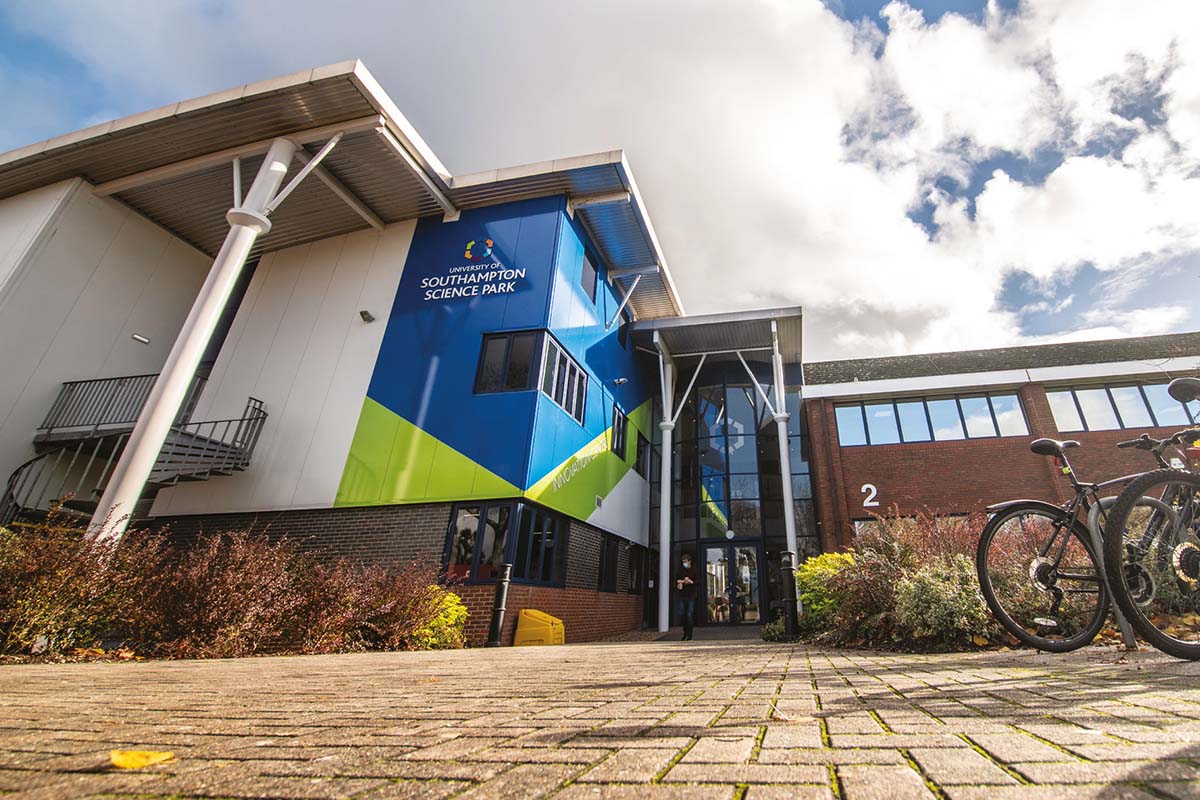
The early 1980s – it was an exciting time technology-wise. Shuttles found their way to space for the first time, while down on planet earth, MTV, CD players, personal computers and camcorders began to find their way into our homes and hearts.
And, in a little leafy corner of Hampshire, the idea of a home for science and technology companies on the South Coast became a reality. Southampton Science Park, which celebrates its 40th anniversary in 2023, has been integral to putting the region on the UK’s innovation map ever since.
The University of Southampton Science Park offers a wide range of quality commercial offices, laboratories, meeting and conferencing facilities across 75 acres. The employees of its 100 resident businesses benefit from coffee shops, early-years childcare, a gym, plenty of healthy open space and an historic conservation area to enjoy.
And its location in Chilworth couldn’t be more convenient: just minutes away from the vibrant coastal scene and the New Forest and South Downs National Parks for employee wellbeing, and with superb commercial connectivity to London, the rest of the UK and Europe via the local ports, airport, motorways and rail networks.
Adding value
There’s no doubt that this Science Park is a prestigious environment from which to do business, but that’s not what sets it apart from other commercial property, as Chief Executive, Dr Robin Chave explains.
“Southampton Science Park has never been about just giving businesses a physical base from which to operate. A big part of what we do here is to foster the growth of innovative technology businesses and the wider regional economy. We welcome entrepreneurial people with great ideas and businesses at all stages, and work with them in a number of ways to give them every opportunity to compete on the world stage.
“We do this through retaining close links to the research-intensive University of Southampton – a global top 100 university and founder member of the celebrated Russell Group – and its graduate talent pool. This close connection provides a logical location for the commercialisation of research and spin-outs from the University. We also run multiple business support schemes and encourage knowledge-share via our varied business and social events programme. Last but not least, we operate a flexible approach to our property strategy which reflects the specific needs of technology companies.”
Business support is a core component of the Park’s – and therefore its resident businesses’ – success. Focused on connecting business founders with mentors, advisors and investors, schemes range from one-to-one growth clinics and informal CEO breakfasts to structured coaching programmes like its business accelerator, Catalyst.
Launched over ten years ago, Catalyst has so far worked with 83 companies, helping them to secure over £48m in early-stage funding and creating over 230 jobs. The Science Park is also home to the globally renowned business incubator, SETsquared, which offers bespoke support for growing member businesses alongside physical space in an Incubation Centre.
It’s an approach that clearly works. The Science Park delivers an estimated £350m in gross value added to the local economy and, despite shifts towards hybrid working practices, occupancy levels remained consistent throughout the pandemic and are at the highest level for a decade.
Recently, it has been recognised as a regional ‘Jewel in the Crown’, with the Local Enterprise Partnership noting that it is an ‘outstanding asset that plays a significant role in contributing to the economy and wellbeing of communities and offers a unique array of benefits to the wider region, making it a vibrant place to live, work and invest’.
Future focused
In its 40th year, Southampton Science Park will not be resting on its laurels as it continues to invest in ensuring that its provision responds to evolving commercial and environmental needs.
In 2023, it will unveil a new Engineering Centre, an exciting bespoke development which will provide high quality workshops and offices and accommodate a new Future Towns Innovation Hub, an industry-academic Centre of Excellence to help make our towns happier, healthier, and cleaner places to live. Work conducted in this Hub will address the important challenges of energy-efficient housing, water conservation, sustainable transport, carbon neutral waste management and recycling, and improving health outcomes.
Chave is highly enthusiastic about this prospect. “We are uniquely positioned to host this new facility and delighted to be at the forefront of this exciting initiative. I’m absolutely confident that the positive societal impacts arising from the
work conducted in this new centre will resonate significantly beyond our region’s boundaries and for generations to come,” he says.
With sustainable development at the forefront of future planning, the Science Park is also working to minimise its
environmental impacts and reach net zero carbon for scope 1 and scope 2 emissions by 2030.
This work includes investing in solar power, higher grade insulation and LED lighting. It hopes to take resident employees on this journey too, with a number of initiatives designed to encourage alternative commuting practices including a Science Park bus service, car share scheme, bookable on-demand hybrid vehicles and a rollout of EV charge points.
Meanwhile, across the Science Park site today, there are companies working on solving the critical conundrums of our time.
AI-powered health monitoring, gas network optimisation, nanoclay orthopaedic treatment, solar power expansion, listener-adaptive 3D audio experiences, mission-critical software, speciality optical fibres, offshore energy, drug discovery, spacecraft propulsion, digital signage, air cargo drones. All this and more is happening at Southampton Science Park today.
The early 2020s. It’s an exciting time technology-wise.





